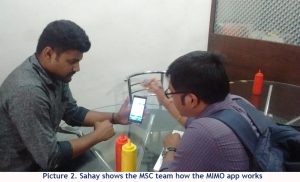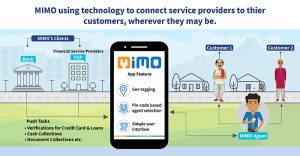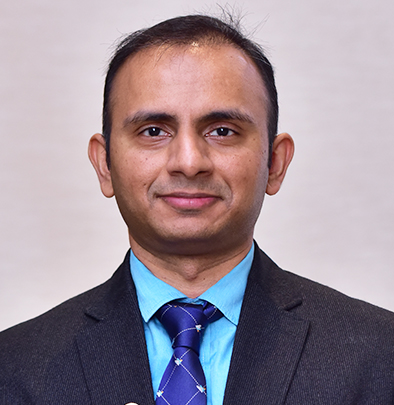MIMO – Bridging the digital gap for the rural workforce
by Sneha Sampath, Anil Gupta and Anshul Saxena
Jun 17, 2020
6 min
Gig workers have been facing the brunt of the coronavirus outbreak. This blog highlights the story of a FinTech startup, MIMO, which uses technology to connect service providers to its end customers through gig workers. Learn how MIMO supports gig workers in these tough times.
This blog is about a startup in the Financial Inclusion Lab accelerator program, which is supported by some of the largest philanthropic organizations across the world – Bill & Melinda Gates Foundation, J.P. Morgan, Michael & Susan Dell Foundation, MetLife Foundation and Omidyar Network.
India has 15 million gig workers or around 40% of the freelance jobs offered globally, and this number has been growing steadily each year. A large proportion of the country’s school dropouts, college students, or partially employed people look out for part-time work to support themselves and their families. This kind of work, popularly known as “gig work”, is often unpredictable, unreliable, and unsustainable. In most cases, gig work arises out of a lack of full-time employment opportunities. Unsurprisingly, we find that the problem of underemployment is more acute in rural areas due to limited economic activities.
Sensing an opportunity to serve the gig economy, serial entrepreneur Lathika Regunathan founded MIMO or Minimum Investment Maximum Outcome. MIMO uses technology to help gig workers across India, especially in rural areas, enhance their earnings. Its mobile application intermediates between the service providers, such as banks and other institutions, and its field officers, typically underemployed youth. The application allows providers to set up a variety of regular and time-bound tasks that they want to outsource. MIMO assigns these tasks to geo-tagged and trained field officers within their chosen locations. The tasks typically include verification of credit card or loan application, collection of cash or documents, and so on. The app features also include analytics, dashboards, and a tracking management mechanism for service providers.
The light-bulb moment
The idea of MIMO came into being when Lathika was working in Latin America in the financial services sector. She observed that the costs of customer acquisition and operations were high in rural areas, which prevented providers from being able to serve customers at the bottom of the pyramid in a feasible manner. Moreover, providers were not able to use a cost-effective platform to serve those customers, especially in locations that were hard to reach. She realized that her home country India must also be in a similar situation, and decided to relocate there soon after to start working on this problem.
The unique pitch
MIMO’s objective is to help the rural and semi-urban workforce take advantage of the digital revolution. Its field officers are generally school or college dropouts in tier 2, 3, and 4 cities. They work with MIMO to earn a livelihood while learning in the digital world.
MIMO also helps financial service and other providers to reach rural markets cost-effectively. Providers find it difficult and expensive to serve customers due to a lack of last-mile infrastructure, distances, and remoteness of many areas. The cost of setting up an extended distribution network, particularly across dispersed rural areas, is high with low returns on investments.
While MIMO allows providers to gain access to the trained workforce and skills closer to the customers that they serve, its field officers get access to opportunities to earn within their localities.
Figure 1: MIMO using technology to connect service providers to its customers.
The impact on LMI segments

Ram Sahay, one of MIMO’s field officers shared his perspective. “I am proud to work with MIMO because unlike my peers, who must carry loads of documents or application forms to their clients, I work through MIMO’s mobile app to complete the same chores in half the time,” he said with a wide smile. Field officers have said that completing tasks for MIMO has increased their income by 20-30%. They also mentioned how their productivity has improved, as they can plan their days better.
The roadblocks
Since its inception, one of the primary challenges MIMO faced was to gain and retain trust from its clients, primarily banks and other service providers. In the absence of visibility to the last mile, these clients had concerns about the credentials and capabilities of the field officers and lacked trust that the field officers could complete the work as per their requirements.
It was much easier for MIMO to overcome challenges while training field officers in technology and application. These included simple things, such as taking the picture correctly, understanding the meaning of a completed form, and so on. It took more time and repeated training to impart soft skills around communication, presentation, and confidence while dealing with customers.
Diversity in geographical regions has been another area of concern for MIMO. Nuances in work habits required MIMO to approach different states differently. In states, such as Bihar and Uttar Pradesh, MIMO struggled to get field officers to finish the tasks on their list in the allocated time. Field officers in the states in southern India are more disciplined and welcome additional tasks.
The FI Lab support
CIIE.CO and MicroSave Consulting (MSC) conducted boot camps and diagnostic sessions to support MIMO. MSC conducted a strategic business planning session with the top management of the company. This exercise helped them think strategically beyond just survival. Through this exercise, MIMO could set medium- to long-term objectives and smart goals. According to Lathika, this helped streamline their internal processes and brought the team together.
Before the workshop, the MIMO team faced issues that are typical to start-ups. The team lacked well-defined roles and responsibilities. For instance, one team member could end up performing an internal process that the other team member was an expert in, which reduced efficiencies. A lack of communication also contributed to such issues. The workshop allowed the heads of various teams to come together and understand the gaps in communication. They were subsequently able to allocate well-defined roles and responsibilities through mutual consent.
Today, MIMO has reduced the turnaround time of their processes by 25% through better work allocation and by setting up communication standards within the company. The workshop and further handholding also transformed MIMO’s management to be more focused and impactful by prioritizing tasks aligned to the broader vision of the company.
A quick diagnostic field study helped MIMO to understand different challenges that field officers face on the ground and to develop measures to address them. It also provided a fair commission structure based on industry standards.
COVID-19: Turbulent times for MIMO and gig workers
Starting with just a couple of clients and 250 field officers in late 2017, MIMO, until February, 2020 served more than 70 clients through 10,800 field officers. With its operations spanning across 19 states in India, the future for MIMO looked promising. Then the coronavirus struck. The entire country was locked down. MIMO’s field operations were shut down completely and the clients reneged on their commitments to continue their business in these times.
Determined to survive, MIMO toyed with the idea of a video verification process. This is not a big, innovative transformation but a minor tweak to make the best use of the resources available: video calling. What started as an interim solution during the ongoing crisis has quickly picked up steam with both clients and field officers, who have been working from home. The clients’ trust in MIMO’s quality of deliverables and the MIMO team’s ability to adopt the new process and train its willing field officers has started to show results. From almost zero transactions in the latter half of March to a couple of hundred today and a pipeline of two big clients joining in, MIMO could be doing even more transactions than the pre-COVID era.
This blog post is part of a series that covers promising FinTechs that are making a difference to underserved communities. These start-ups receive support from the Financial Inclusion Lab accelerator program. The Lab is a part of CIIE.CO’s Bharat Inclusion Initiative and is co-powered by MSC. #TechForAll, #BuildingForBharat
 by
by  Jun 17, 2020
Jun 17, 2020 6 min
6 min




Leave comments